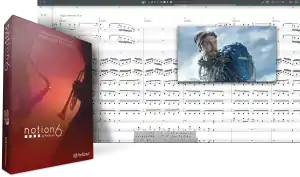Notion (software)
Notion, previously stylized as NOTION, is a computer software program for music composition and performance, created by NOTION Music (formerly Virtuosoworks[1]) of Greensboro, North Carolina, now owned by PreSonus.[2] It is available for Microsoft Windows, macOS and iOS.
 | |
| Developer(s) | PreSonus (formerly Notion Music) |
|---|---|
| Initial release | 2005 |
| Stable release | 6.8
/ October 21, 2020 |
| Operating system | Windows, macOS, iOS |
| Type | Scorewriter |
| License | Commercial Proprietary Software |
| Website | www |
Composition
Notion supports composition using a computer keyboard/mouse, MIDI keyboard, MIDI guitar, MIDI file, MusicXML file, or handwriting recognition.[3][4] It automatically handles aspects of music notation such as stem direction and alignment of rhythmic values, [5] and supports the input and output of notation in tablature form, synchronized with the standard music notation.[6]
It includes an audio mixer to set volume levels, perform panning, and add effects such as equalization, compression and reverb.[7]
From version 3 onward, it supports ReWire, third-party VST effects and other third-party sound libraries, including presets for products from the Vienna Symphonic Library, EastWest, Miroslav Philharmonik, and Garritan Personal Orchestra.[1]
Playback and Performance
Notion's sample library for playback was recorded at Abbey Road by the London Symphony Orchestra.[1][8] The playback engine has options for real-time interpretation of tempo and other score markings such as articulations and performance techniques.[9]
Users can capture playback in wav digital audio files for transfer to CD or digital audio workstation, or for conversion to other audio formats such as mp3 or wma.[7]
Integration with Studio One
Starting with version 3.3 in 2016, the Studio One DAW (also developed by PreSonus) is integrated with Notion version 6 and above, allowing the two applications to perform real-time audio and MIDI streaming (via either ReWire or PreSonus' own UCNET protocol) to share audio, note, track, VST and score data, either with both applications running on the same computer, or on multiple computers connected to a network.[10][11]
This integration was expanded further by Notion versions 6.4 (May 2018, following the release of the Chord track for Studio One in version 4), allowing the transfer of chord-level information between the two applications;[12] and v.6.5 (Jan 2019), which enabled the automatic translation of drum tracks into standard percussion notation.[13]
Notes
- Stewart, Dave. "Notion Music Notion 3". Sound on Sound. Retrieved 2018-03-20.
- "Presonus Buys Notion". Synthtopia. 2013-09-23. Retrieved 2019-01-23.
- "Notion | Features | PreSonus". PreSonus. Retrieved 2018-03-20.
- McDonough, Andy (2017-12-05). "Review: PreSonus Notion 6 Music Notation Software". American Songwriter. Retrieved 2019-01-23.
- See article by Brian Humpherson in Zone Magazine, 2008 Issue 16
- Bigwood, Robin. "PreSonus Notion 5". Sound on Sound. Retrieved 2019-01-14.
- "Notion". PreSonus. Retrieved 2018-03-20.
- Stewart, Dave. "Virtuosoworks Notion". Sound on Sound. Retrieved 2019-01-23.
- Expanded on by editor review in Computer Music, February 2008
- "Studio One & Notion Integration". Sound on Sound. Retrieved 2019-01-14.
- Huyskens, Marcus (2016-09-03). "Studio One 3.3 - Notion 6 Integration Overview". Production Expert. Retrieved 2019-01-14.
- Hughes, Russ (2018-06-06). "Studio One 4 - The Amazing Power Of The Chord Track". Production Expert. Retrieved 2019-01-14.
- "New Notion 6.5 update increases integration with PreSonus Studio One". Rekkerd. 2019-01-17. Retrieved 2019-01-17.